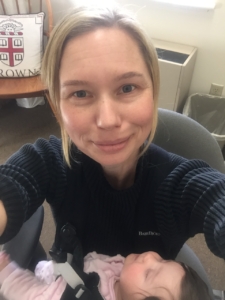Sexual Assault, Anorexia Nervosa, and Recovery
In honor of April’s Sexual Assault Awareness and Prevention Month (SAAM), as a result of the dedicated efforts of the Rape, Abuse, and Incest National Network (RAINN), I wanted to share my personal experience of the connection between sexual assault, Post-Traumatic Stress Disorder (PTSD), Anorexia Nervosa (AN), and recovery.
Content note: descriptions of sexual violence
Unfortunately, I have a long history of sexual assault that ranged from family members to significant others. This was especially difficult for me, as I had mixed feelings of love and anger, trust and betrayal, attention and shame. I believed that everything was my fault, that I deserved the treatment that I received, and that it would be my cross to bear for a lifetime.
I developed PTSD from these traumatic events, as well as others (including years of ballet at a grueling professional level, and several unexpected deaths in my immediate family). Along with other anxiety disorders (Generalized Anxiety Disorder [GAD], Obsessive Compulsive Disorder [OCD], Panic Disorder [PD]), these experiences have left me on “red level high alert.”
Like my anxiety disorders, my AN was genetically predisposed, and environmentally triggered. Until recently, I had focused solely on the role of ballet in the development of my AN. This made sense, given the premium that is placed on the aesthetic of very thin bodies. I have only just begun to be able to process in therapy the effect of my early sexual assaults on my subconscious desire to keep my body as child-like as possible, to deflect from any attention.
I realized that a part of me was holding on to the AN as a coping mechanism for the sexual assaults. My recovery was not able to begin until I processed the sudden death of the family member who was the original perpetrator. In retrospect, it didn’t feel “safe” to let the AN go until I knew that I would not be a victim anymore.
My recovery is an ongoing effort to try to put my experiences in context, learn what I can from them, let go of any shame, and give myself permission to move on with my life. It is a difficult journey, and one that I would not have chosen, but I am grateful that I have survived.
If you or someone you care about has been the victim of sexual assault, please act now to ensure that you get the help you need and deserve. Call RAINN’s National Sexual Assault Hotline at 800-656-HOPE.
For recovery resources and treatment options, please visit our resource center. If you or someone you know is struggling with an eating disorder, call ANAD’s Helpline at: (888) 375-7767 or the National Alliance of Eating Disorders Helpline at: (866) 662-1235.
If you are thinking about suicide, call or text the National Suicide Prevention Lifeline at 988. In crisis situations, text “HOME” to 741741 to be connected with a trained volunteer from the Crisis Text Line.
Heather, MSW, LICSW, QCSW, ACSW previously served on the Board of the National Eating Disorders Association (NEDA) (including the Development Committee, Research Advisory Council, Conference Committee Co-Chair), and collaborates with her NEDA colleagues on Eating Disorder research studies, papers, and presentations. Through her position at Brown University Department of Psychiatry and Human Behavior, she has also been collaborating with her local Rhode Island Hospital/Hasbro Children’s Hospital Eating Disorders Partial Hospital, Outpatient, and Home-Based clinical programs since 2013. Heather had Anorexia Nervosa and has been recovered since 2012. Her blog posts can be found at: Project HEAL, NEDA, and Medium.





